This post may contain affiliate links. Please read our disclosure policy.
This traditional Makdous recipe is for olive-oil cured vegan stuffed eggplant with a red pepper, chilli, walnut and garlic filling – Perfect for breakfast or a side dish alongside other mezze
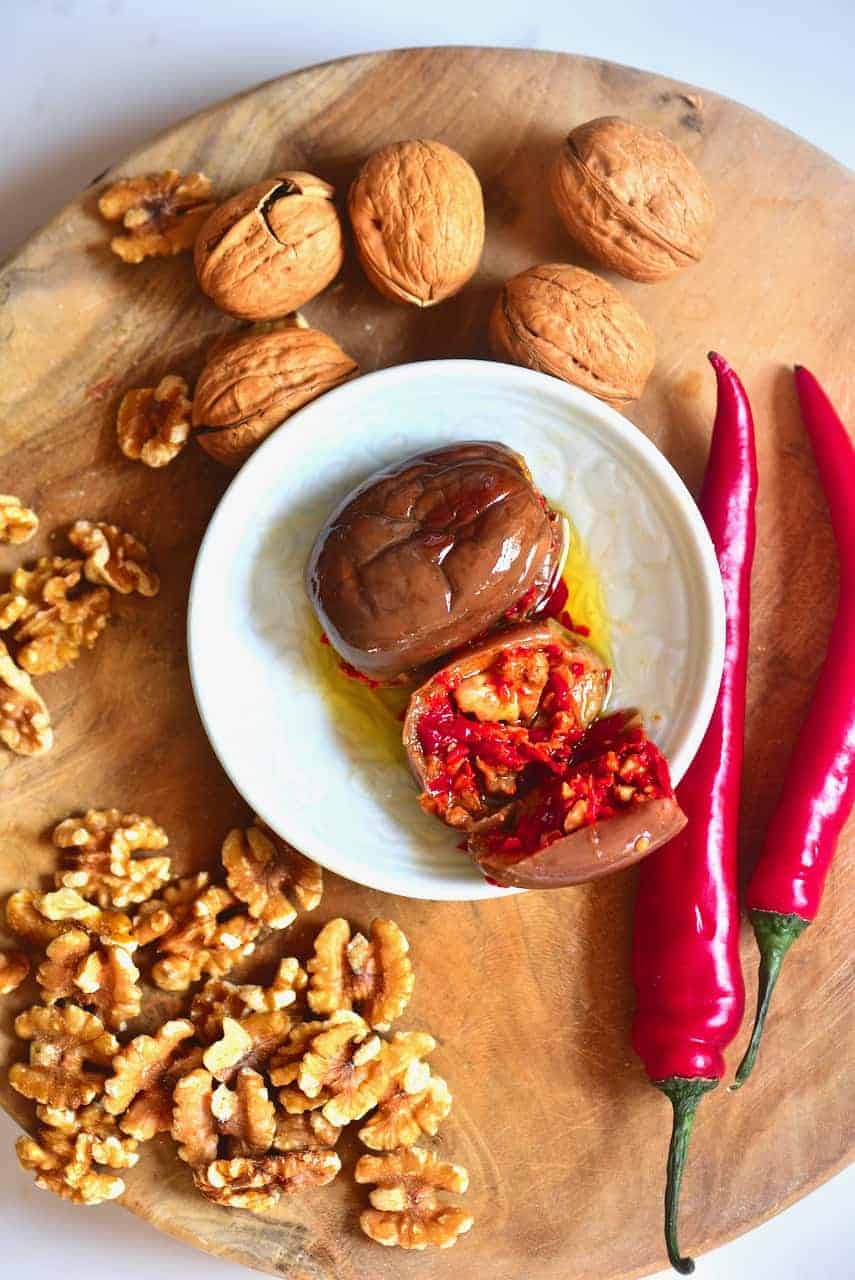
Growing up in Lebanon, makdous was a staple in our pantry – delicious olive oil-cured vegan stuffed baby eggplant (i.e. pickled eggplant) with a simple filling of pepper, chilli, walnut and garlic. While this dish is popular in Levantine and Middle Eastern kitchens, it’s not something I’ve seen a lot of at all in the UK. However, next time you’re looking for a vegan stuffed eggplant recipe, then you might want to give this one a go!
This makdous recipe uses baby eggplant, perfect for fitting in a large jar and curing in a pickling liquid of salt and olive oil. From baked eggplant to grilled eggplant, I’ve tried this ingredient in many forms, but this particular recipe is unique, comforting, and reminds me of home.
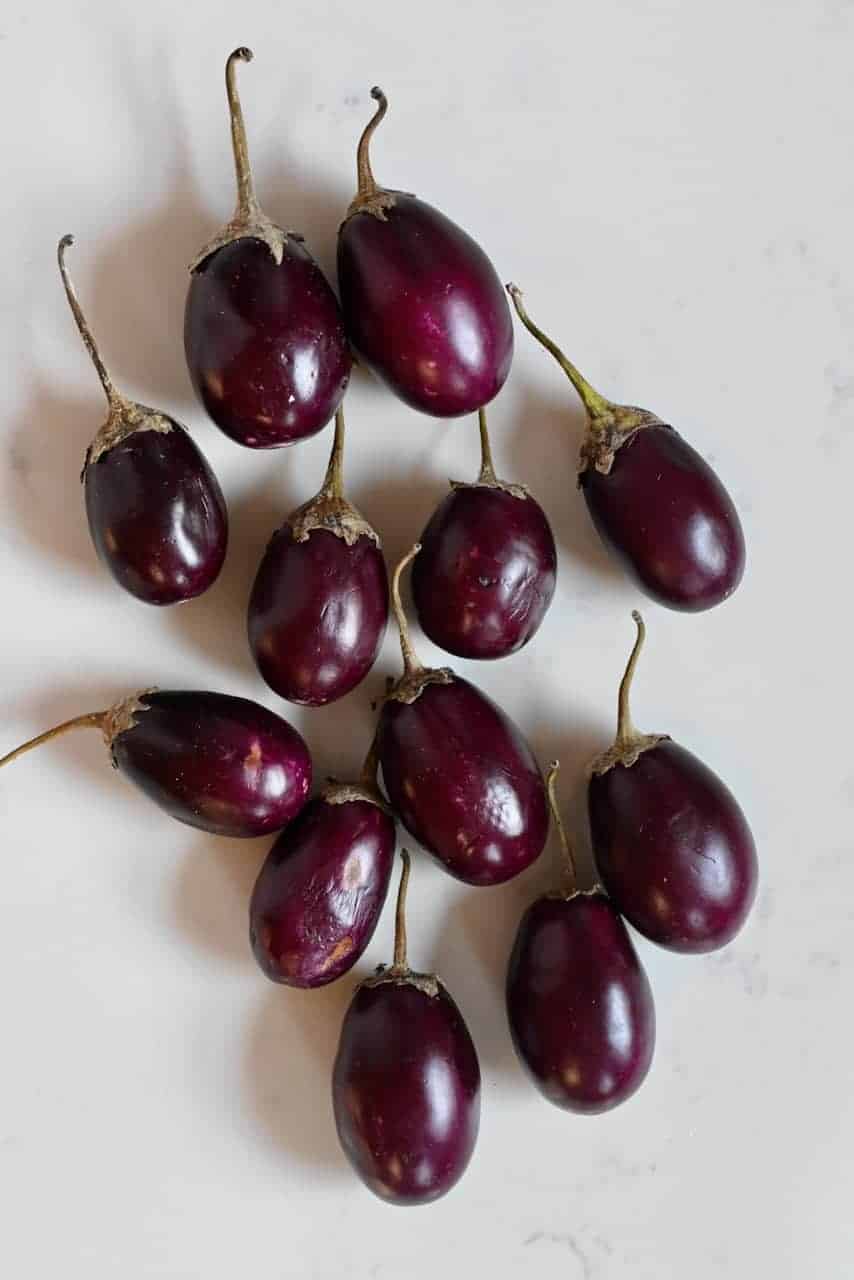
While it is traditionally prepared in time for winter, so then you have enough pickled aubergines to last you through the winter months, this is a delicious recipe that can be made at any time of the year that baby aubergine is available. Once appropriately stored in olive oil, these makdous have a shelf life of up to a year!
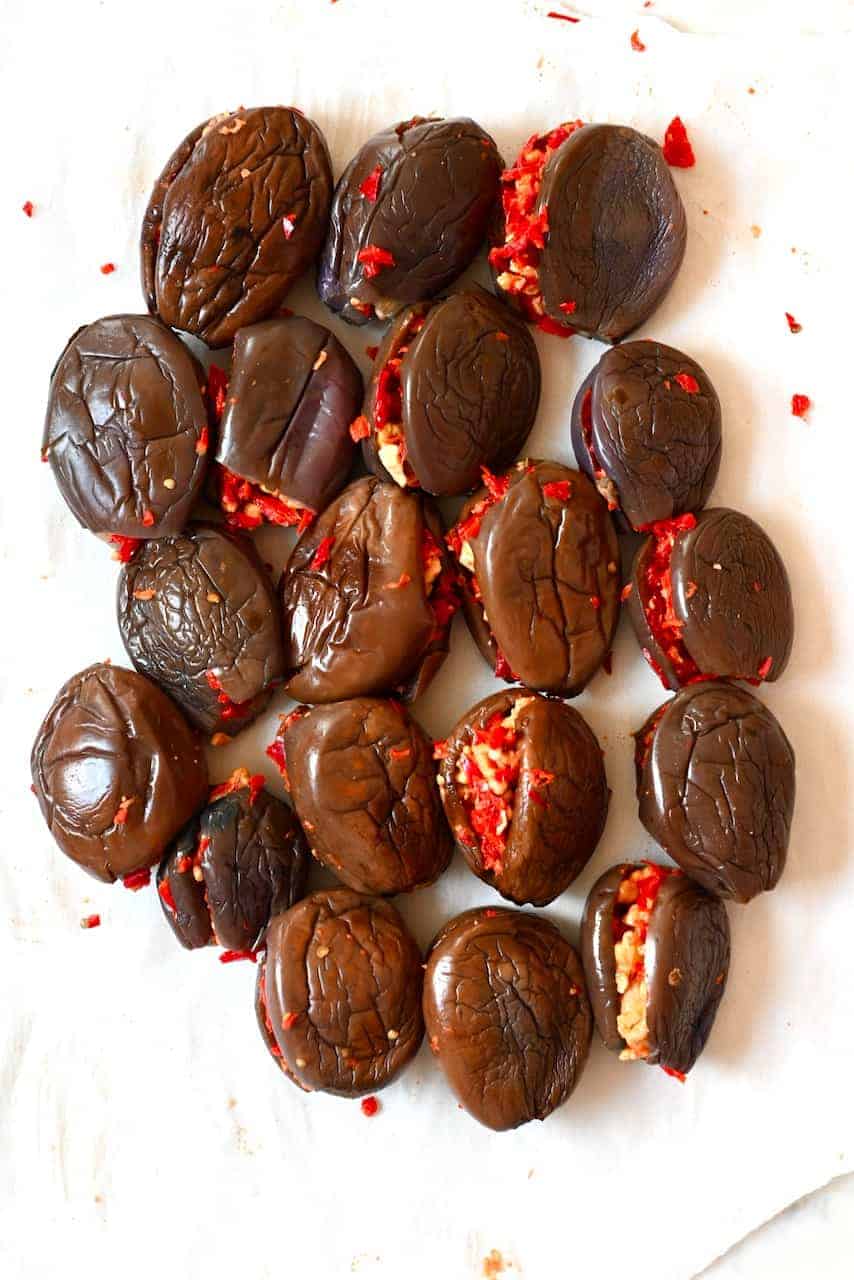
Plus, the recipe is only made up of a few steps;
- Cook the eggplant
- Press the eggplant
- Stuff the eggplant
- Combine in a jar with pickling liquid
- Leave to marinate, and voila
The pickled aubergine/eggplant can then be eaten as part of breakfast, dinner, a snack and/or made into a wonderful eggplant side dish to a variety of meals. I also love simply having a couple in a wrap or sandwich.
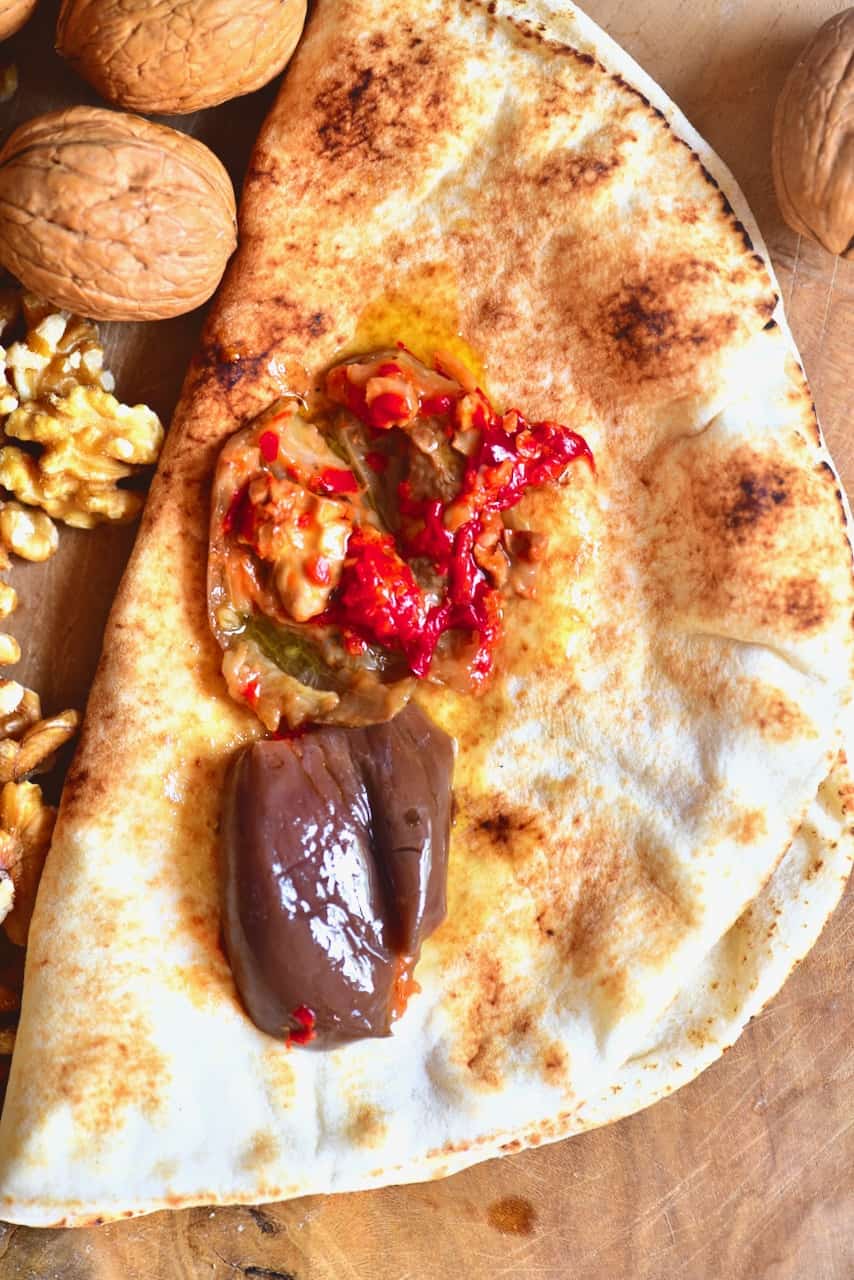
Want to save this recipe?
The Makdous How-To
What’s needed
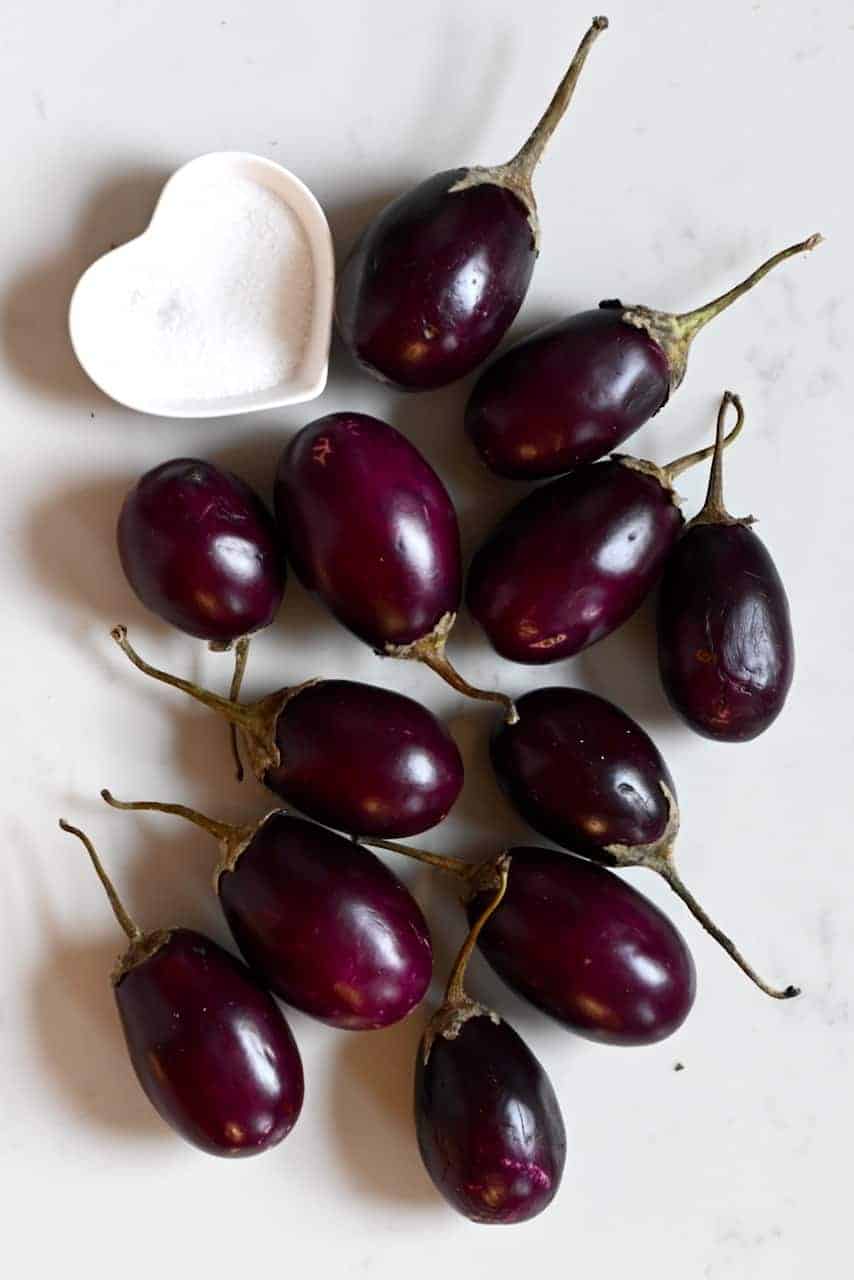
- baby eggplants – the smaller, the better
- red peppers and chillis, walnuts and garlic – to make the stuffing
- olive oil, salt – for preserving and pickling
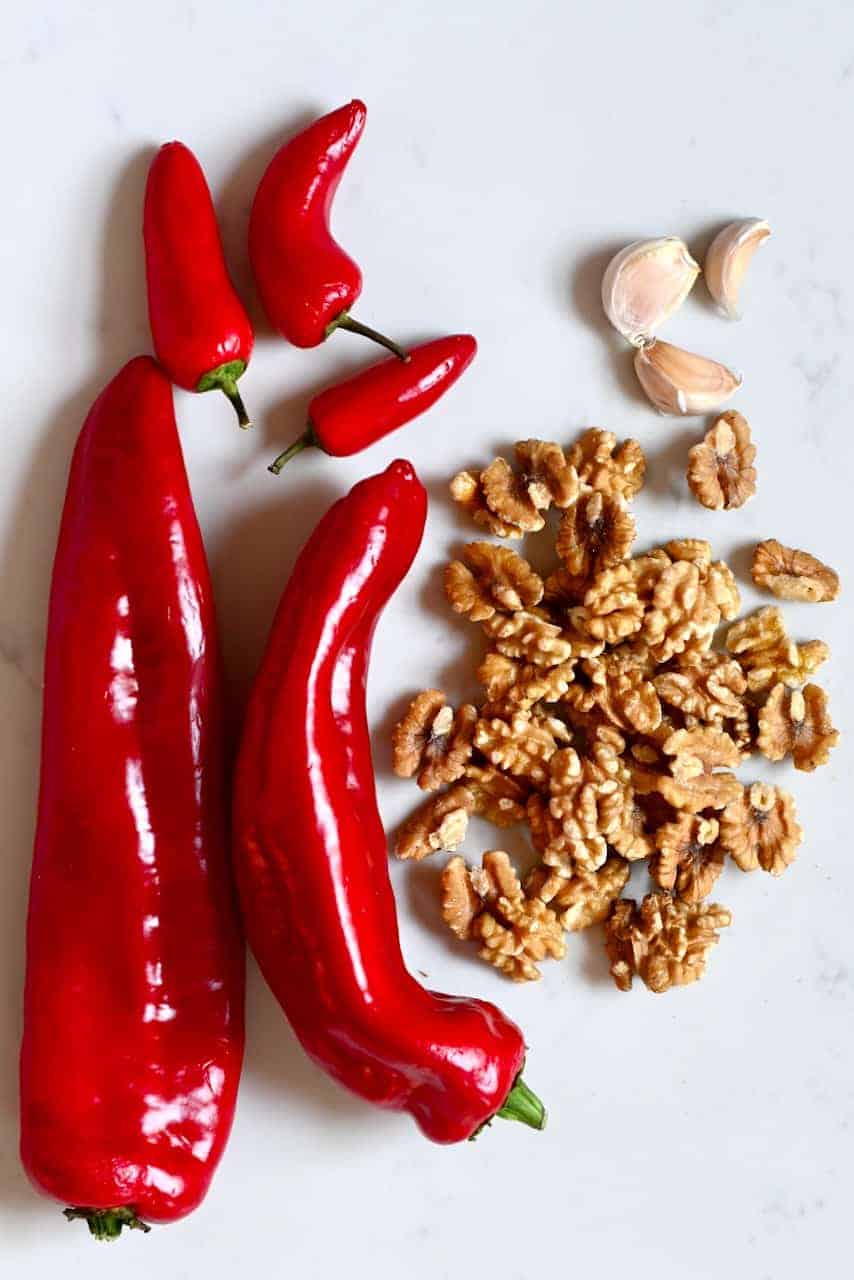
The Steps
Start by cooking the eggplants. Boil enough water in a large saucepan and then add the eggplants. Boil for 5-10 minutes until the eggplants are softened.
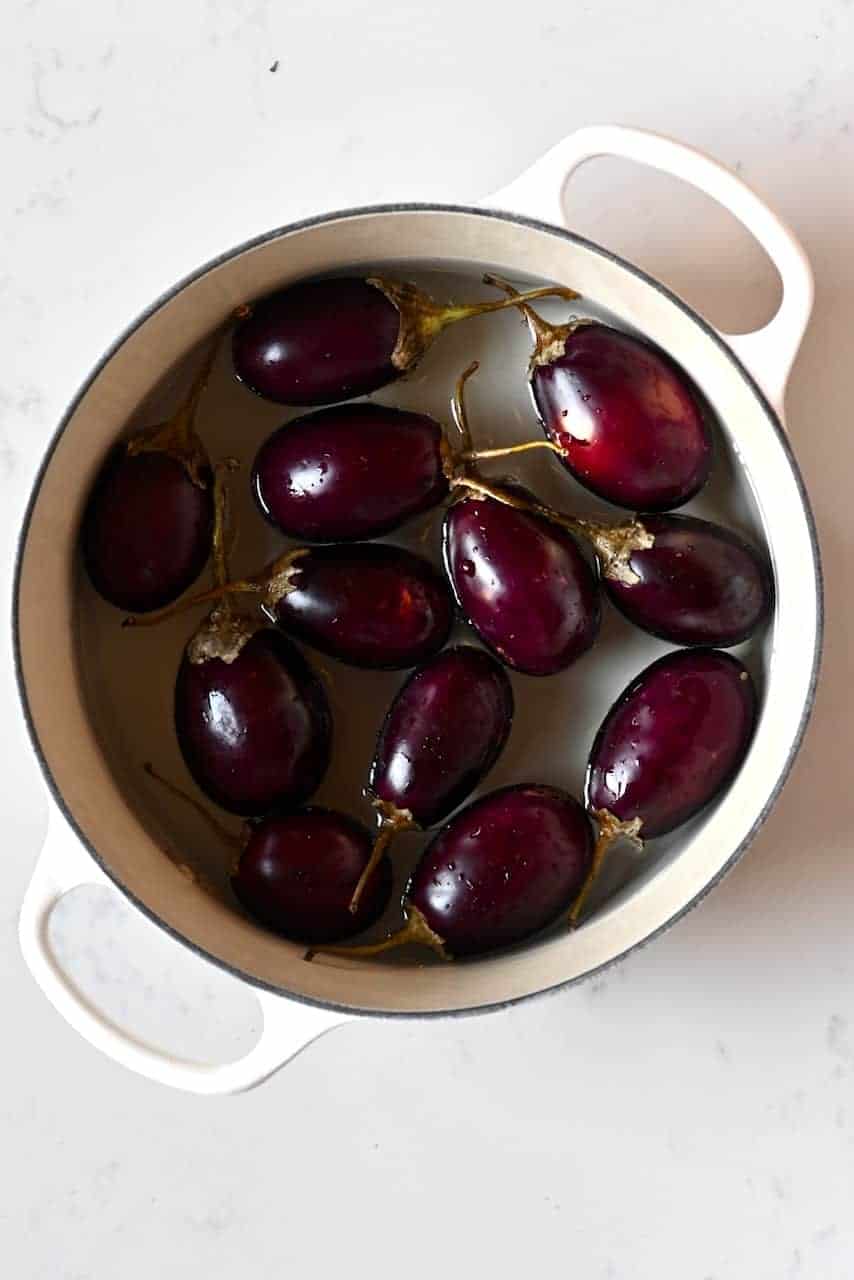
Once they have softened, turn off the heat and let them rest in the water for 10-15 minutes. Then drain them.
Cut the tops of the eggplants. Then carefully slice half-way through, lengthwise – like a book.
Rub some salt on the inside of each eggplant then arrange them on a flat surface, not touching each other and press them with a heavy object. You could use a big pan lid or the bottom of a flat dish to place on top of them, then add another heavy object on top. (see video)
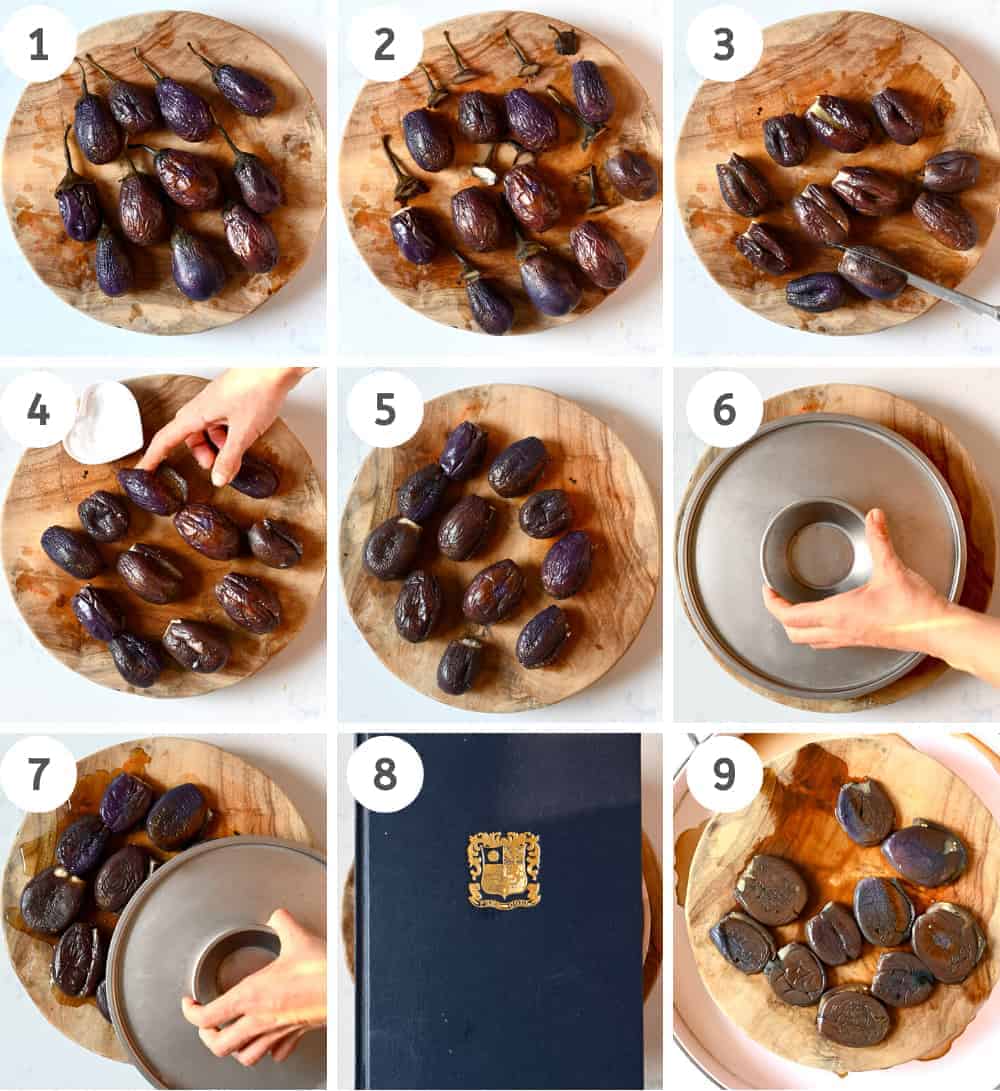
Alternatively, you could arrange them on top of a kitchen towel, within a colander and press with a heavy object.
With the combination of pressing and salt, this should help remove all the excess water from the eggplant. Keep them pressed for a few hours or even overnight to get as much of the water out as possible. The key is to keep them in a cool area, and this process can take up to 24 hours, do be patient and check them after every 5-6 hours.
Note- If you don’t press all the water out of the eggplants then they can be ‘sour’ tasting, which isn’t what you want.
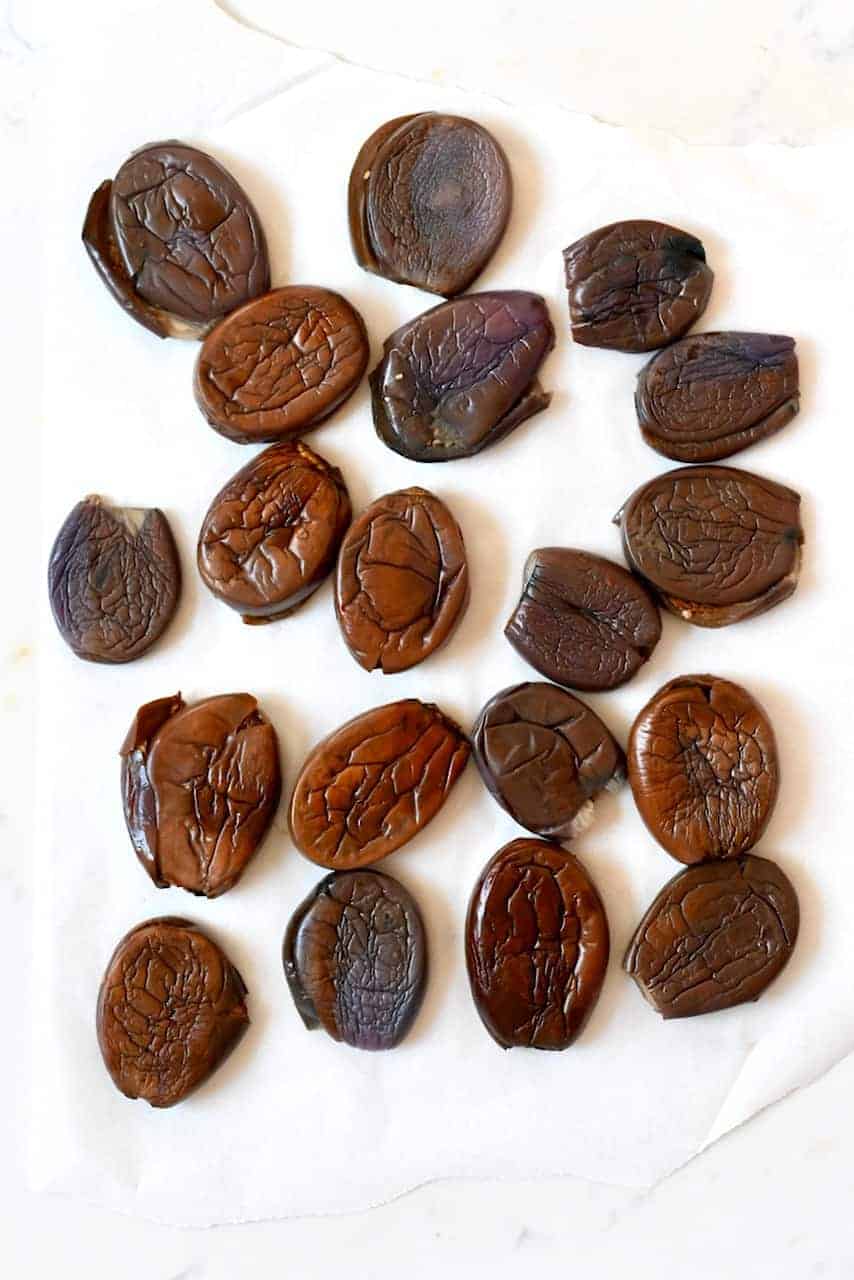
When you are ready to proceed, first make the stuffing. Slice the peppers and remove all seeds. Then either finely chop them or blitz them in a food processor/blender for a bit.
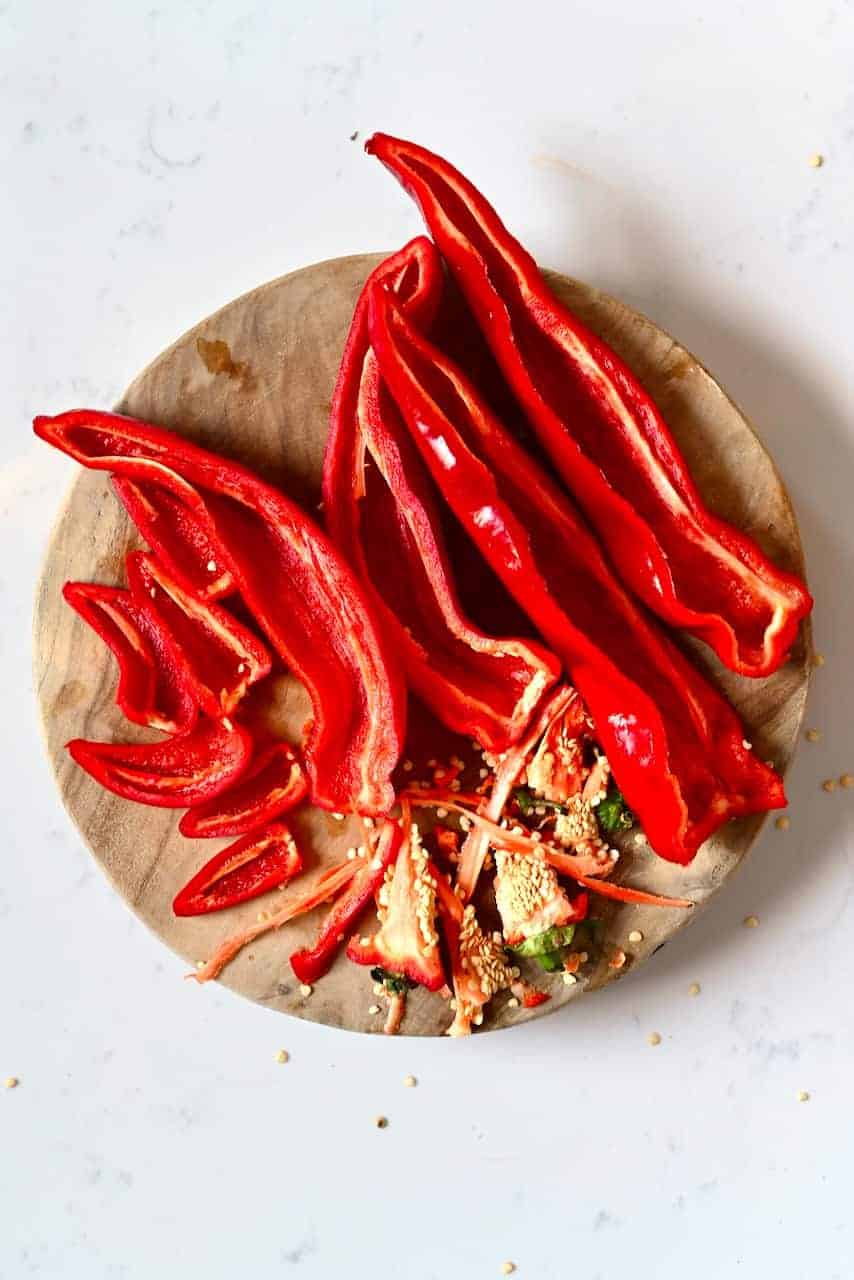
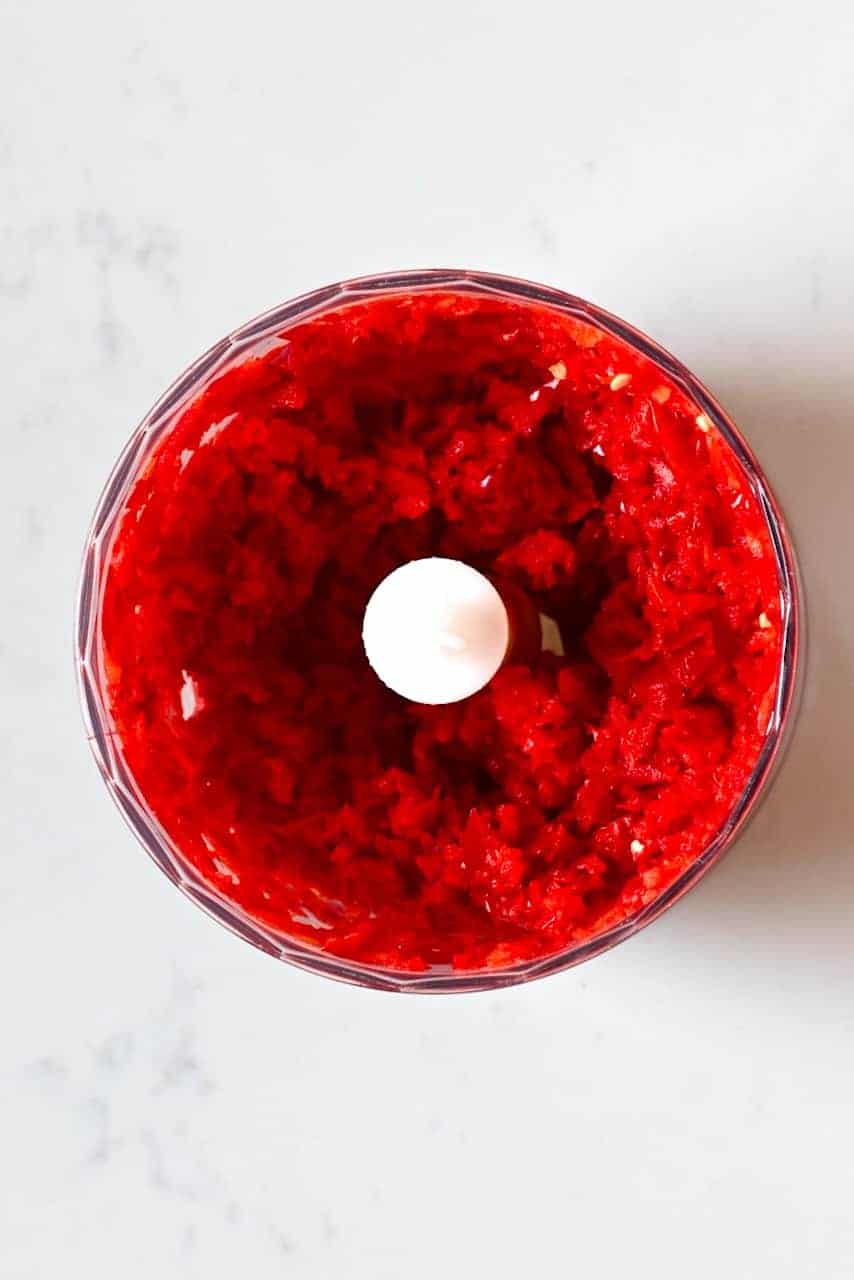
Next, strain the liquid from the crushed peppers. You can put them in a sieve and press out all the excess liquid.
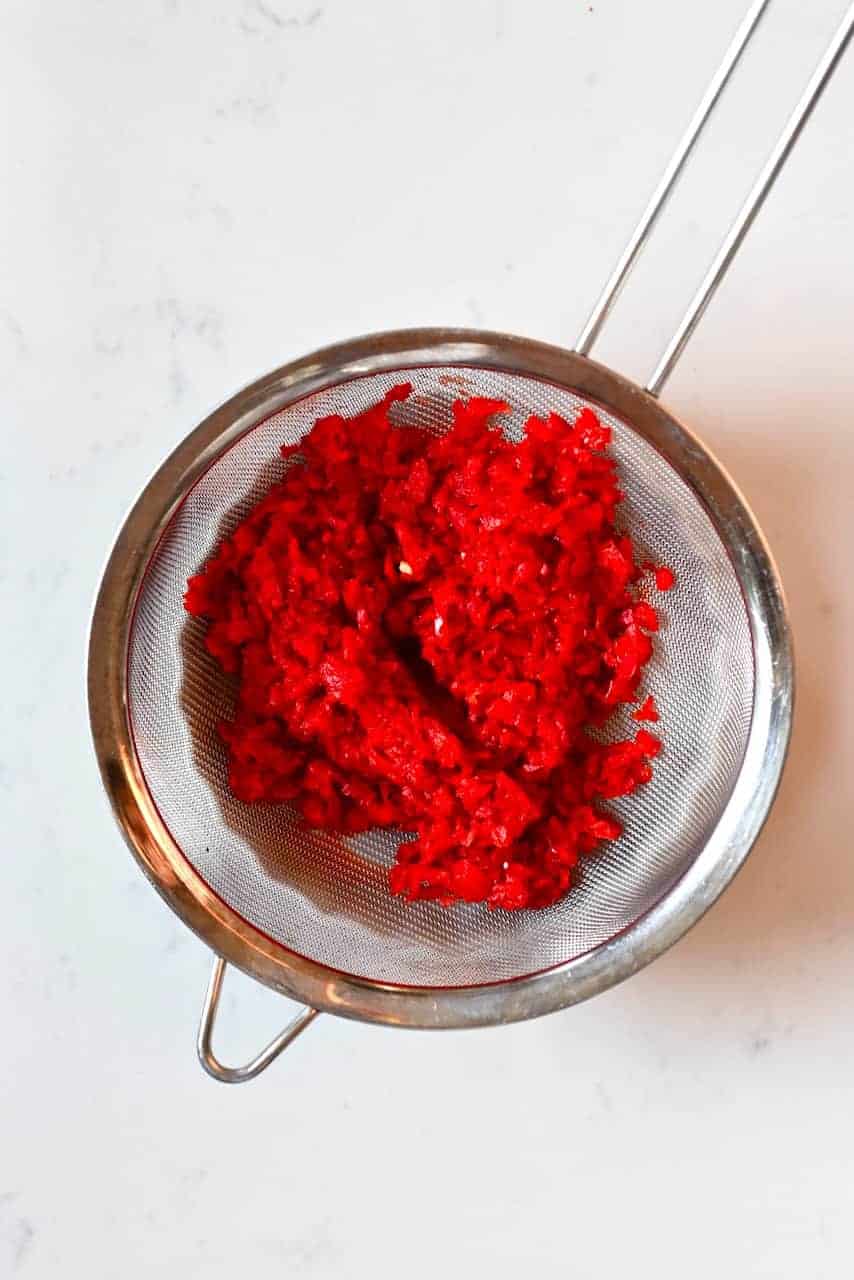
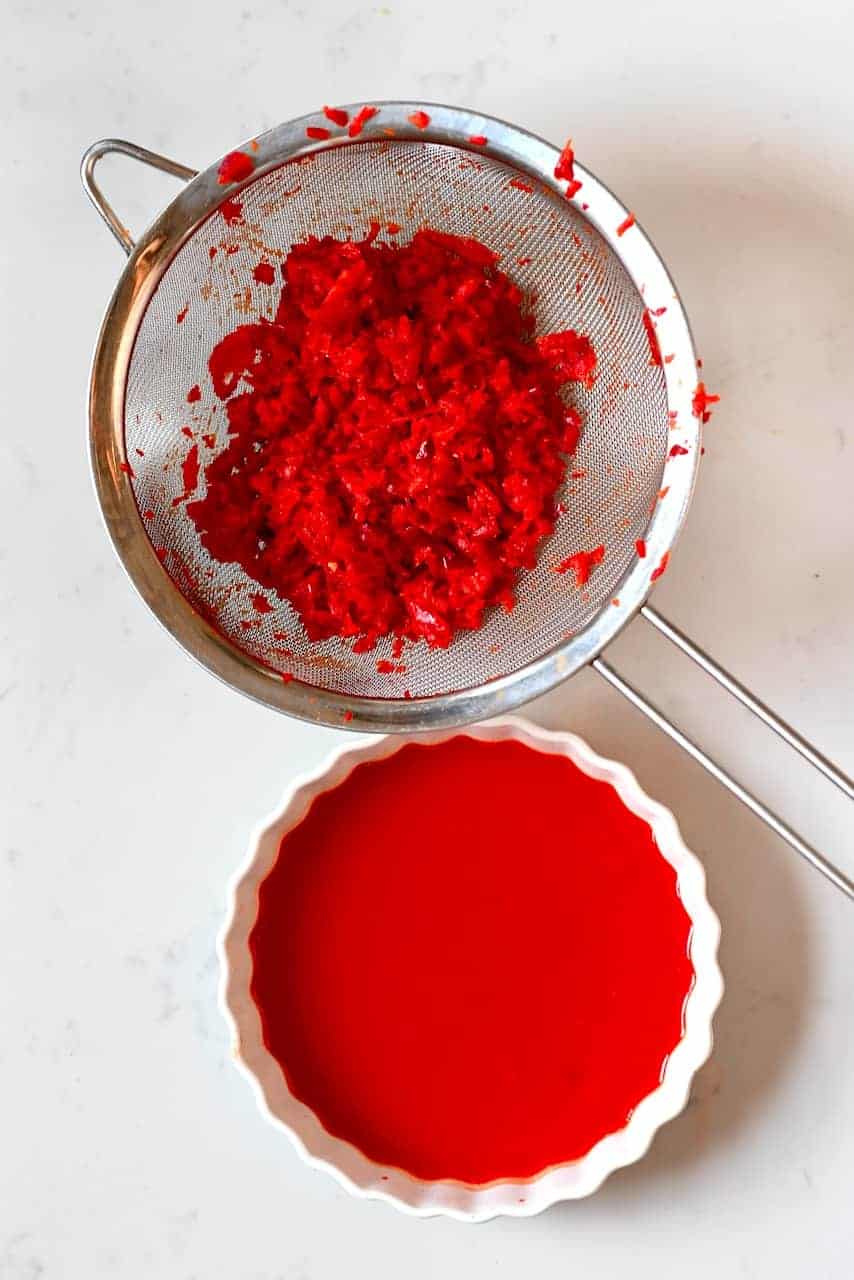
Note: the drained pepper liquid can be used in making tomato sauces or dips or pasta sauces.
Mash or grind the garlic cloves and roughly chop the walnuts. If you prefer, you can grind the walnuts into even smaller pieces.
Mix the peppers, nuts and garlic together.
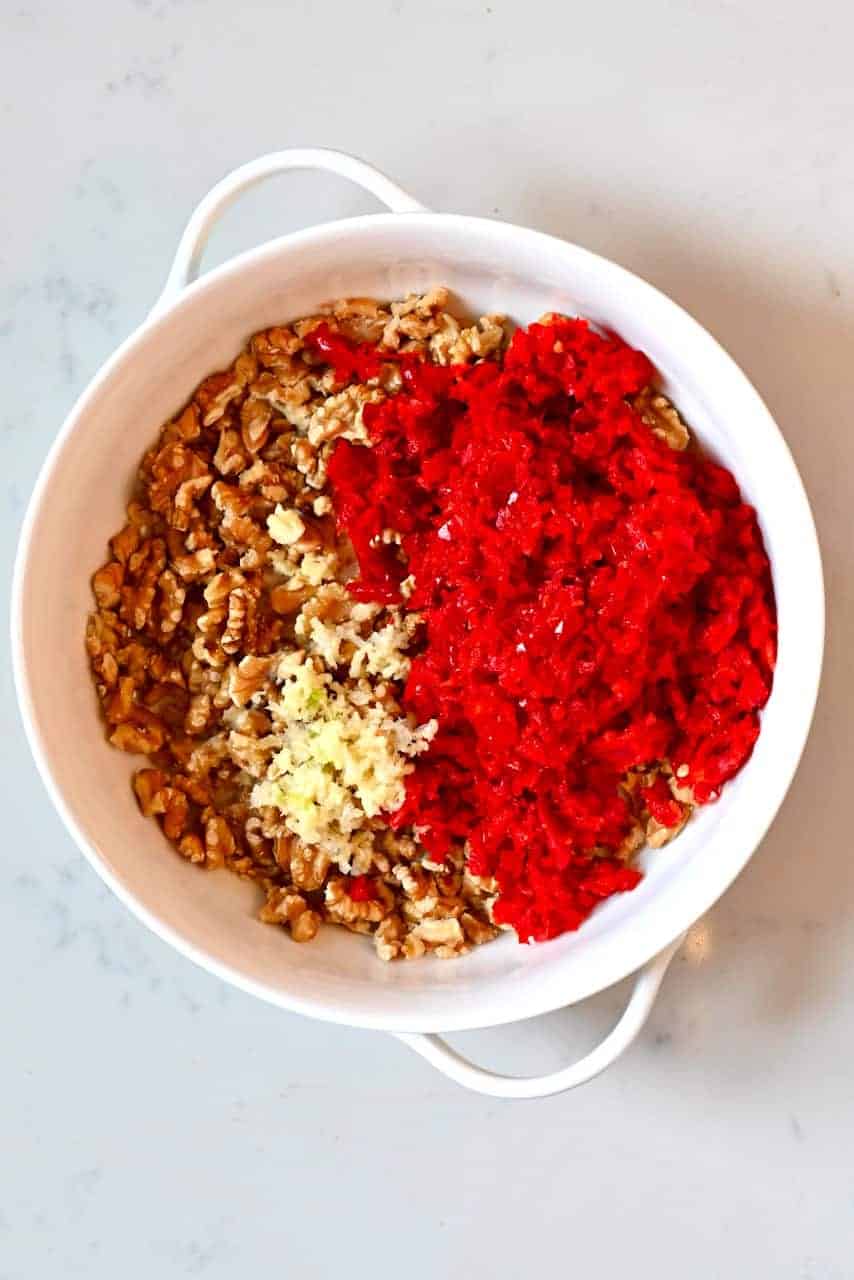
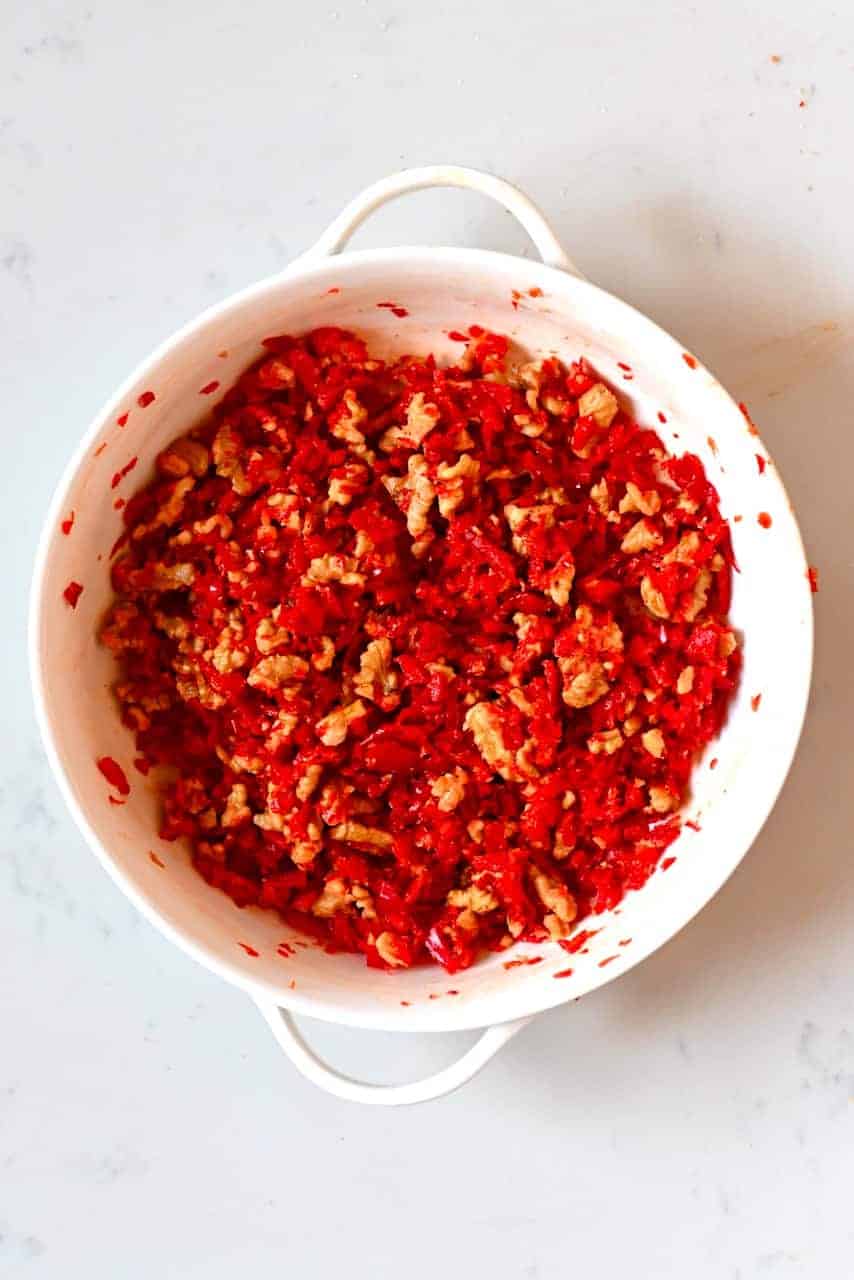
Stuff the eggplant shells with about 1 tBsp of the pepper walnut mixture. Depending on the size of the eggplants, adjust the amount.
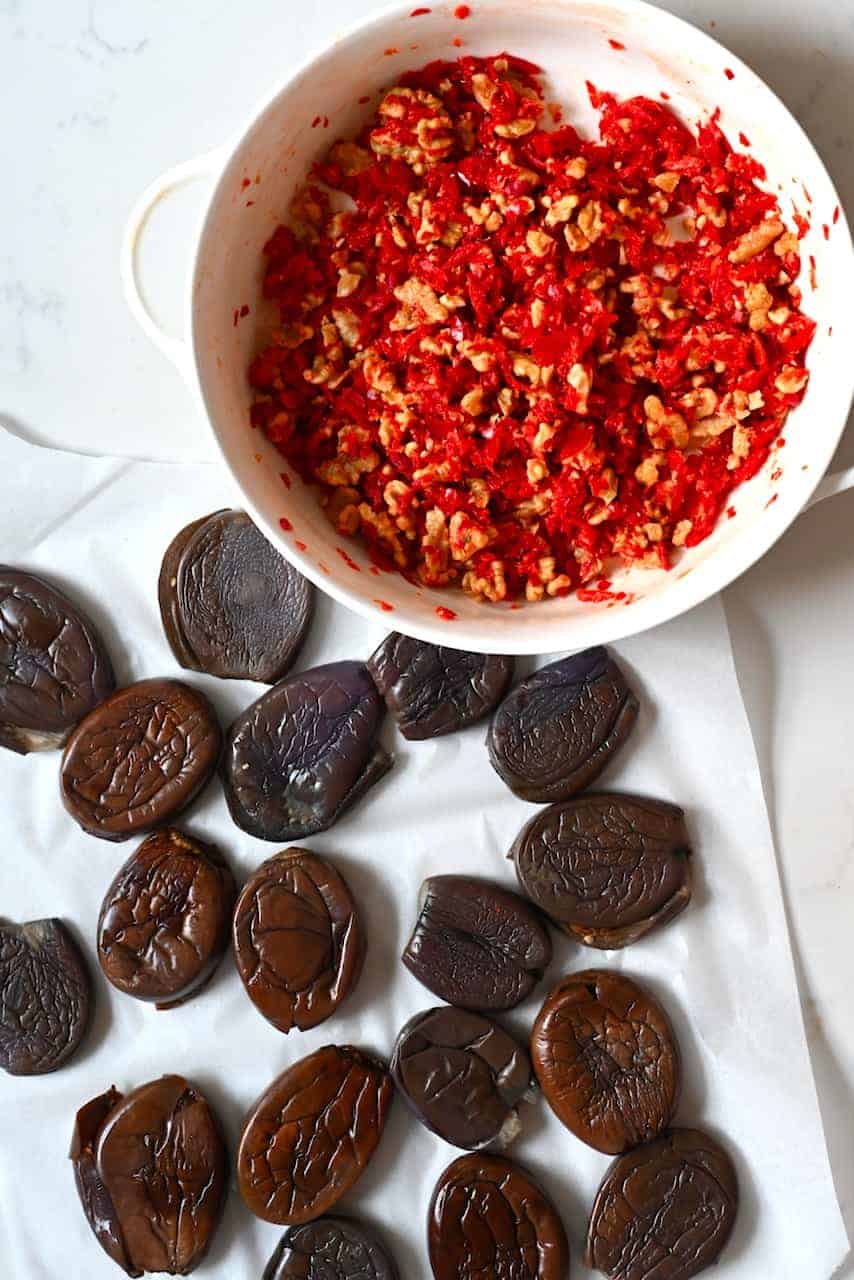
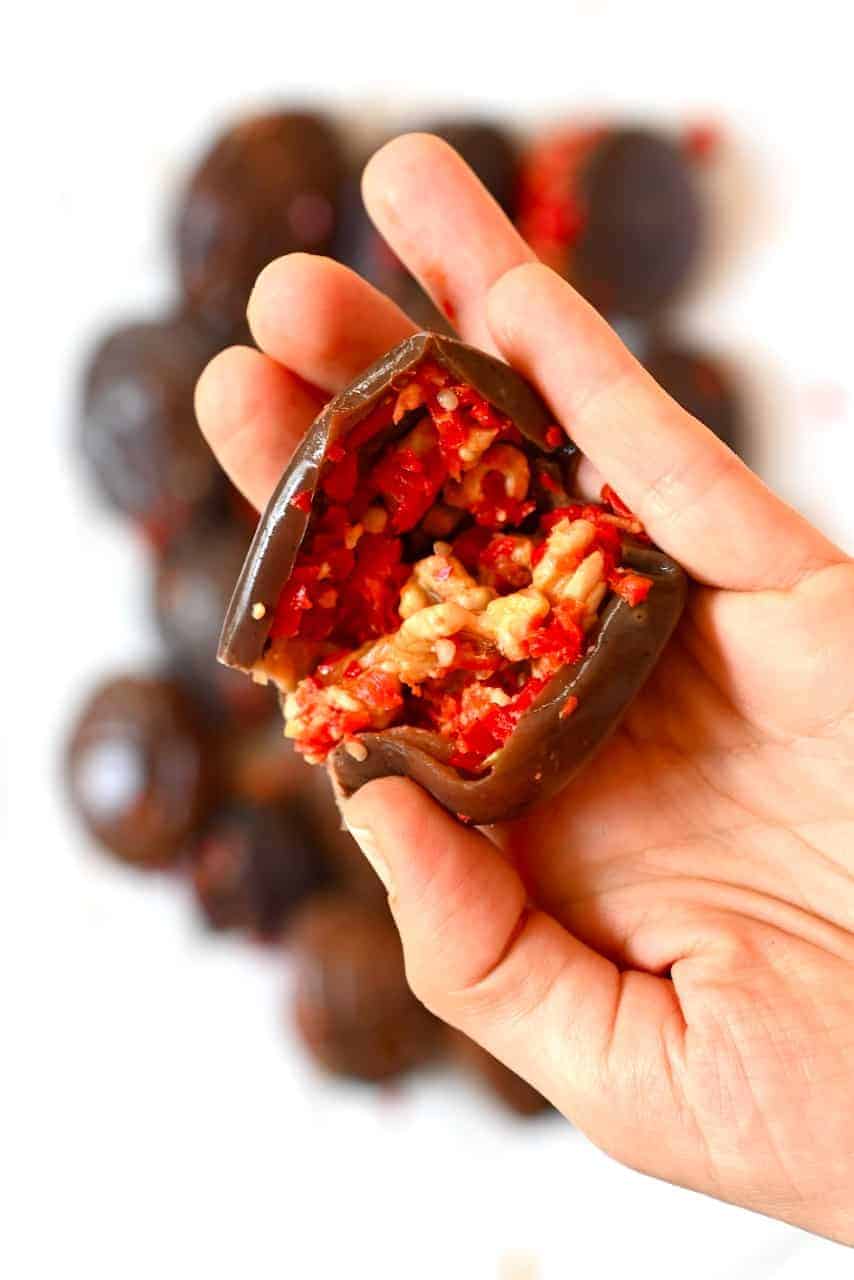
For the next step, use a sterilised clean glass jar. To sterilise the jar, simply wash it with hot water, then put it in the oven (no rubber parts) for 10 minutes at 160ºC. Or after washing, pour boiling hot water over the jar (just make sure it’s heat-safe!)
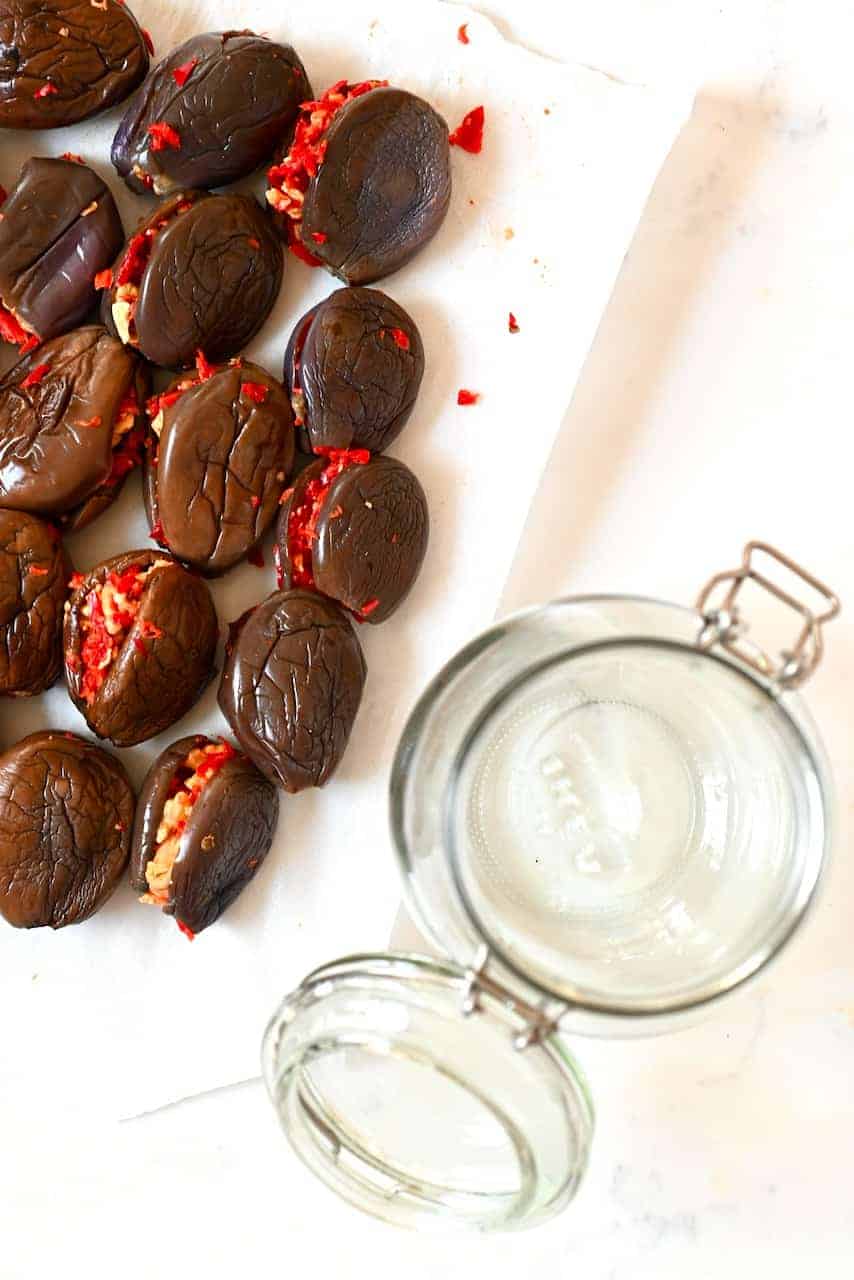
Arrange the stuffed eggplants in the jar. Stack them carefully so that the stuffing doesn’t fall out.
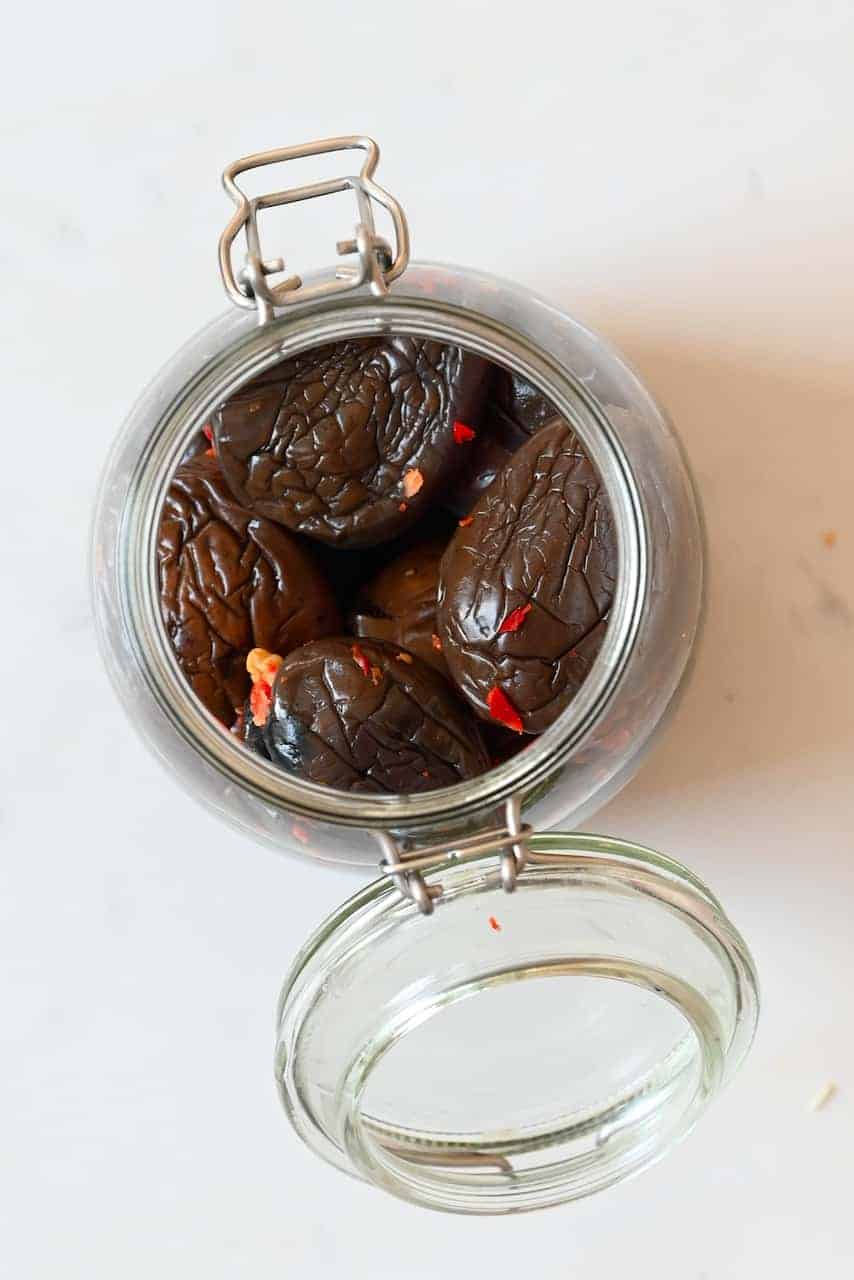
Sprinkle liberally with salt on top then fill the jar with olive oil. Make sure all the eggplants are entirely covered, then tightly close the jar.
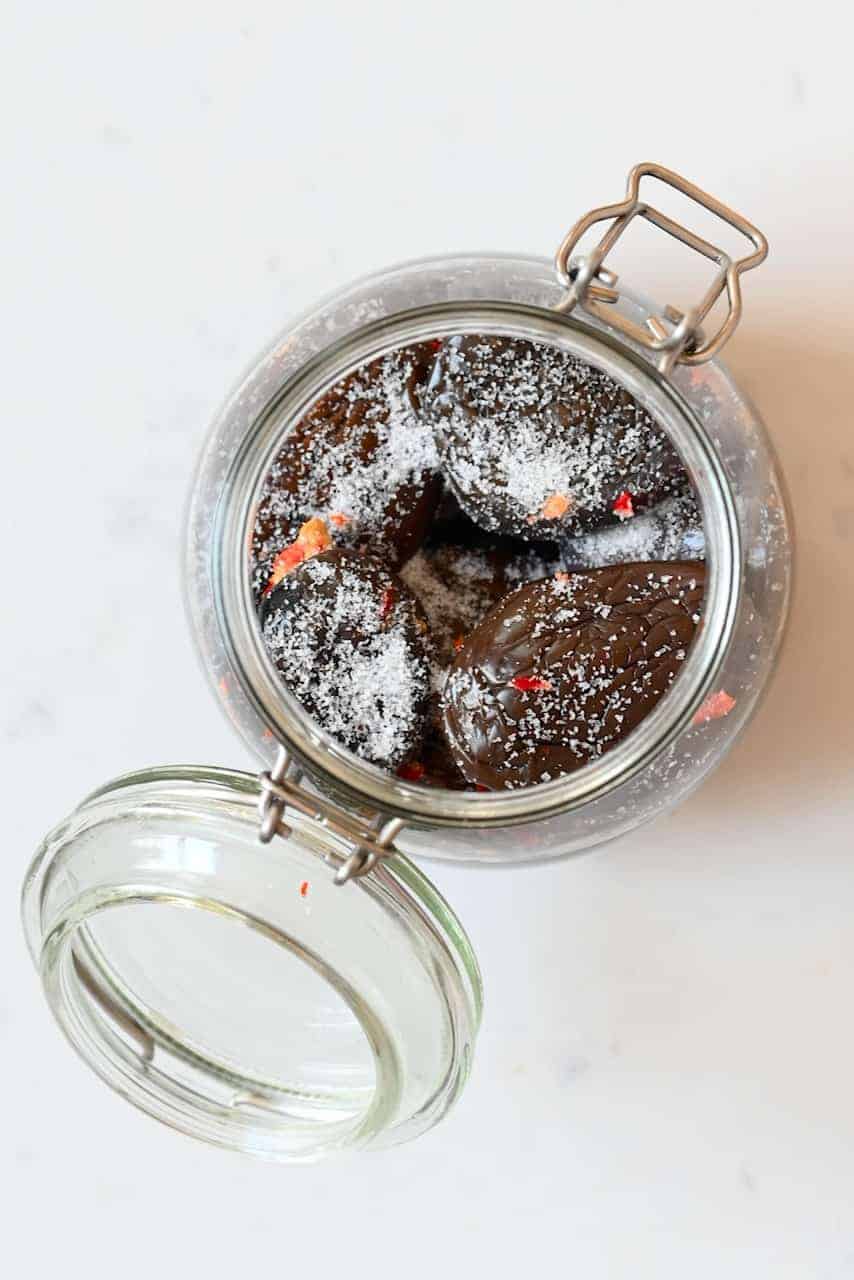
To help the olive oil penetrate all the way into the jar, you can use a spoon or knife to lodge down into the sides of the jar and ‘wiggle’ it, to allow the olive oil to get everywhere.
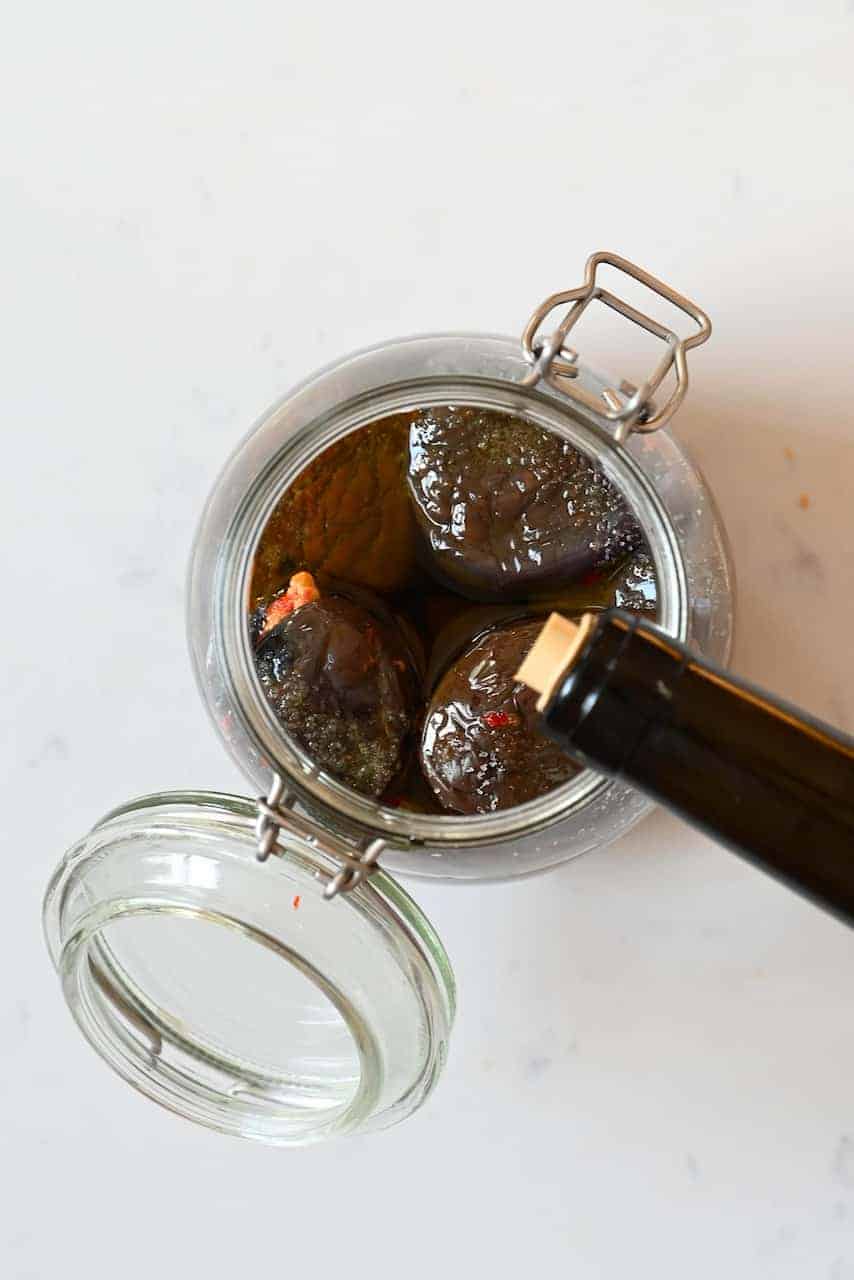
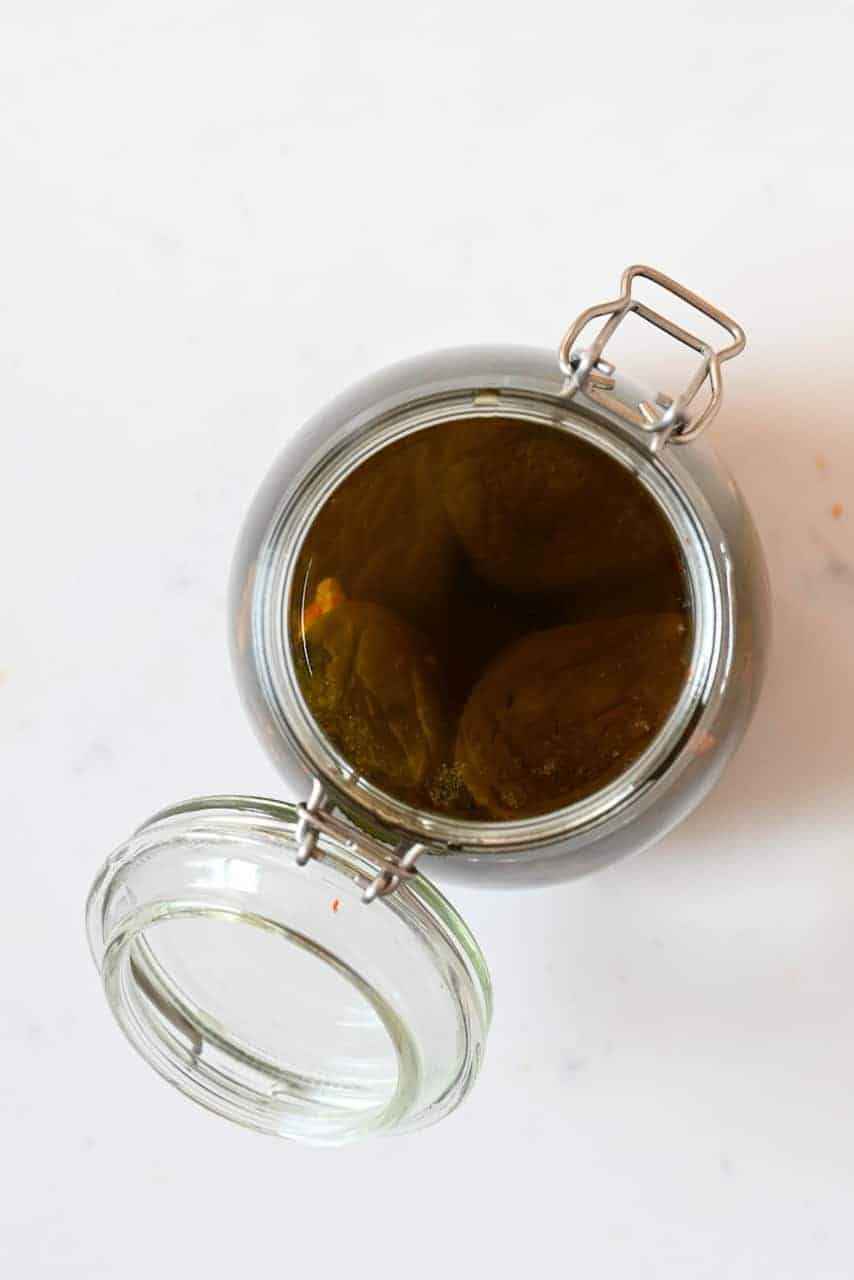
Note: After the eggplants are consumed, you can still re-use the oil – it gets infused with the aromas of the eggplants and the stuffing.
Store your jar in a cool, dark place such as a kitchen cupboard.
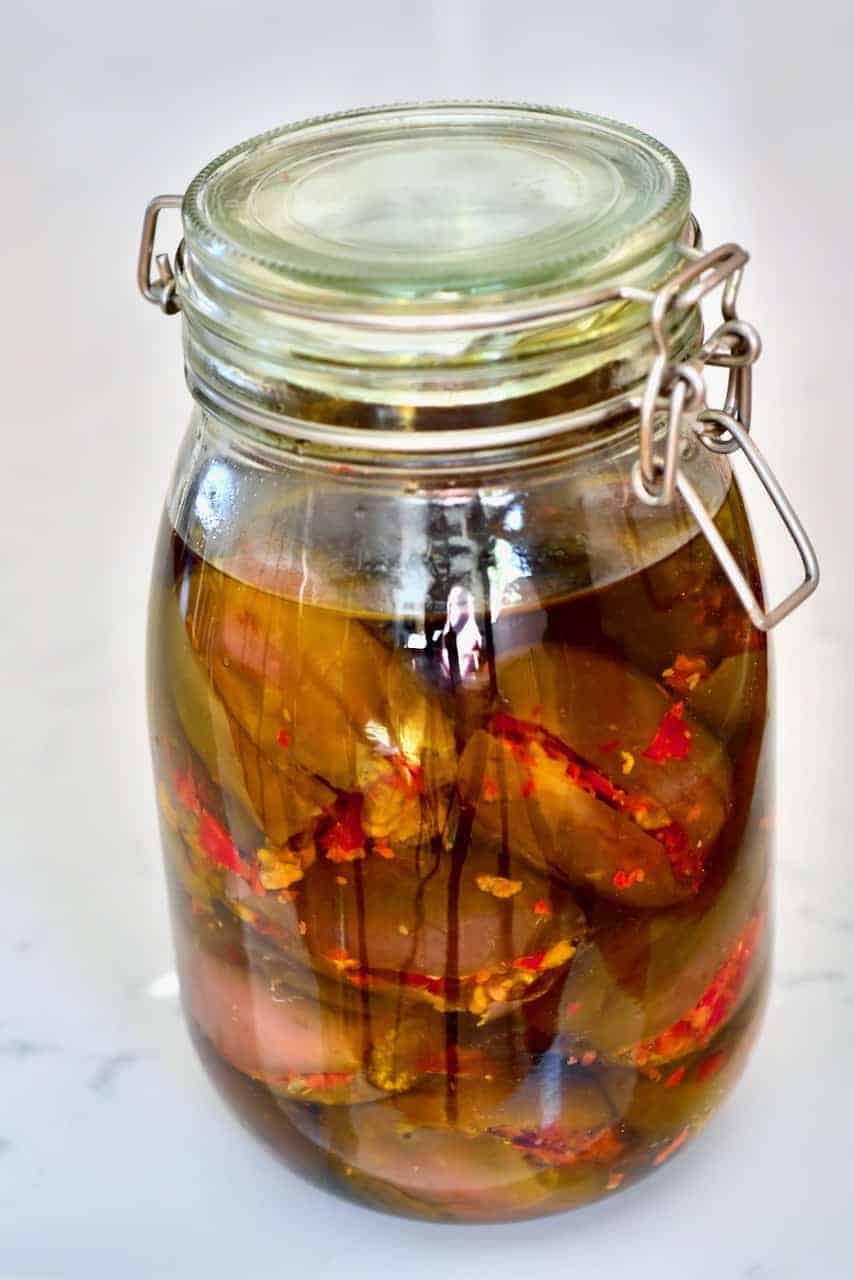
The pickled eggplants – Makdous – will be ready in about 10-14 days (although some people find they’re ready at seven). If at any point you notice that the olive oil isn’t entirely covering the eggplants, add more olive oil.
If you keep them in the oil, completely covered, the Makdous can keep for up to a year. No need to refrigerate, just keep at room temperature in your cupboard as the olive oil acts as a natural preserver.
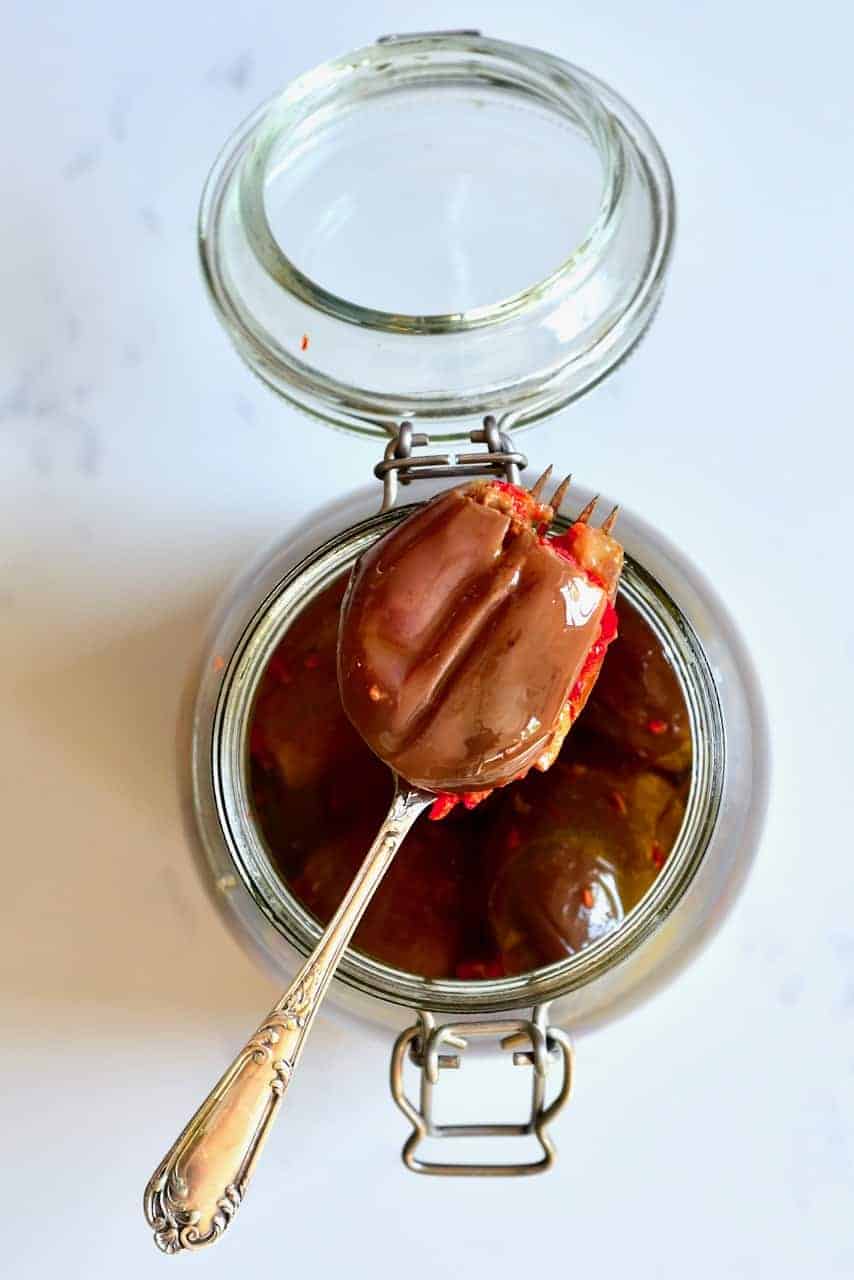
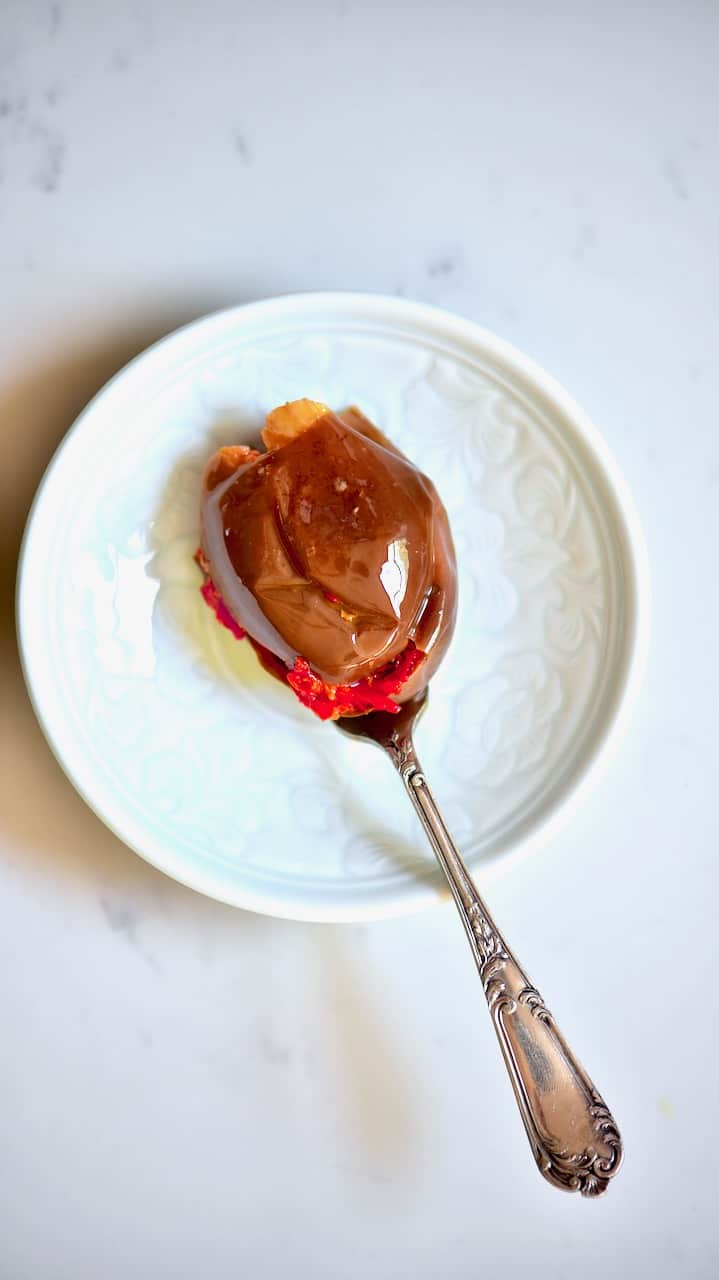
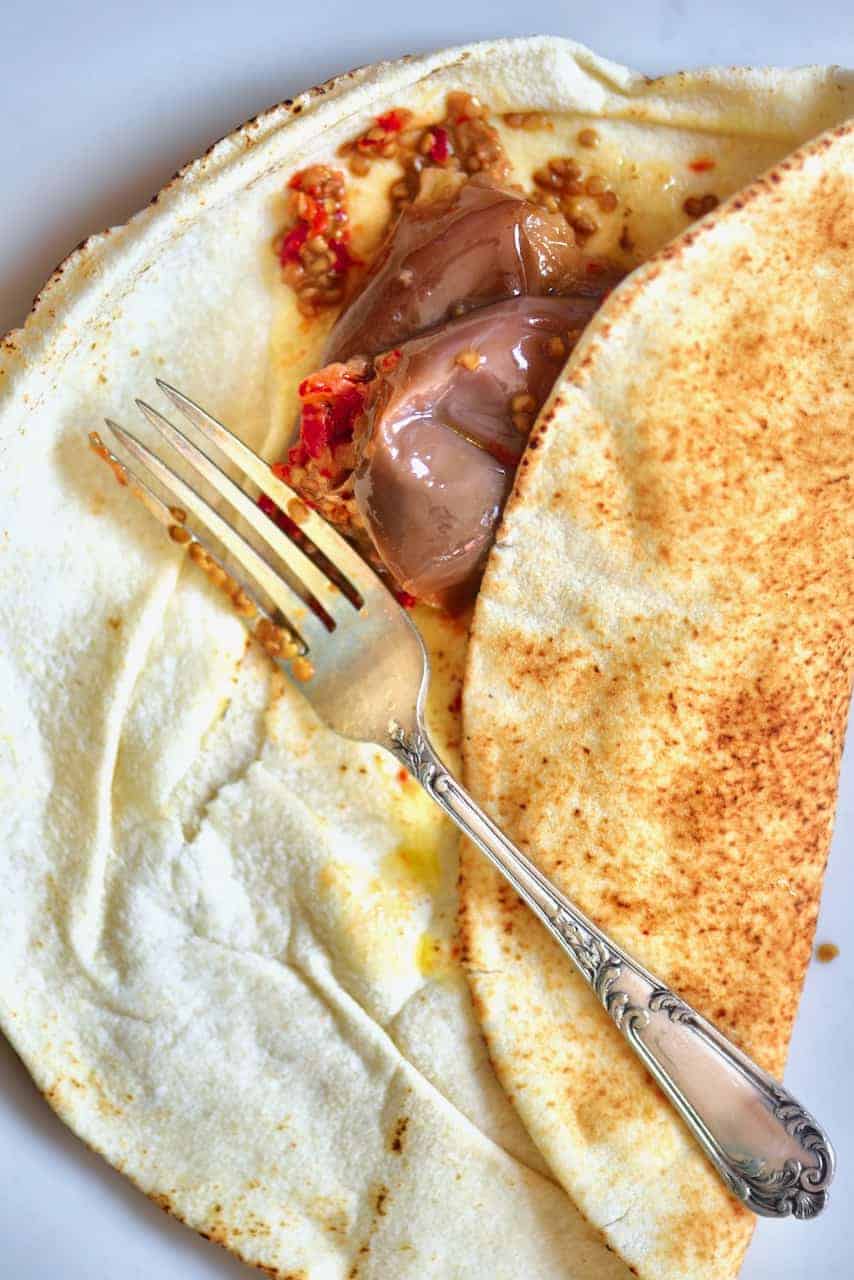
Other Lebanese vegan recipes you may like
If more Lebanese side dishes are what you’re in the mood for then, you might like this Fatayer (Lebanese spinach pie), or batata harra.
Alternatively, you might like this Simple Traditional Lebanese Fattoush Salad or even this Authentic Falafel – just to name a few. You might also like this Lebanese Garlic Sauce (Toum) recipe.
And, if you are looking for other eggplant recipes, check out this recipe for Spicy Roasted Eggplant Dip.
If you have any questions, leave a comment below Also, I love seeing your recreations so feel free to tag me on Instagram @AlphaFoodie.
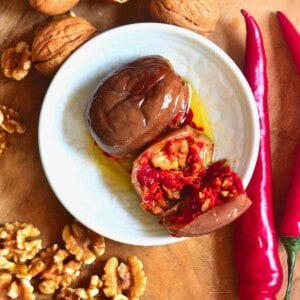
Pickled Stuffed Eggplants Makdous
Ingredients
- 18 baby eggplants
- 2 red peppers
- 3 chill peppers small ones
- 1 cup walnuts
- 3 garlic cloves
Instructions
- Boil enough water in a large saucepan and then add the eggplants. Boil for 5-10 minutes until the eggplants are softened
- Once they have softened, turn off the heat and let them rest in the water for 10-15 minutes. Then drain them.
- Cut the tops of the eggplants. Then carefully slice half-way through, lengthwise – like a book.
- Rub some salt on the inside of each eggplant then arrange them on a flat surface, not touching each other and press them with a heavy object. You could use a big pan lid or the bottom of a flat dish to place on top of them, then add another heavy object on top. Alternatively, you could arrange them within a colander and press with a heavy object.
- With the combination of pressing and salt, this should help remove all the excess water from the eggplant. Keep them pressed for a few hours or even overnight to get as much of the water out as possible. The key is to keep them in a cool area, and this process can take up to 24 hours, do be patient and check them after every 5-6 hours. See video.
- When you are ready to proceed, first make the stuffing. Slice the peppers and remove all seeds. Then either finely chop them or blitz them in a food processor/blender for a bit.
- Next, strain the liquid from the crushed peppers. You can put them in a sieve and press out all the excess liquid.**
- Mash or grind the garlic cloves and roughly chop the walnuts. If you prefer, you can grind the walnuts into even smaller pieces. Then, mix the peppers, nuts and garlic together.
- Stuff the eggplant shells with about 1 tBsp of the pepper walnut mixture. Depending on the size of the eggplants, adjust the amount.
- For the next step, use a sterilised clean glass jar. To sterilise the jar, simply wash it with hot water, then put it in the oven (no rubber parts) for 10 minutes at 160ºC. Or after washing, pour boiling hot water over the jar ( just make sure it’s heat-safe!
- Arrange the stuffed eggplants in the jar. Stack them carefully so that the stuffing doesn’t fall out
- Sprinkle liberally with salt on top then fill the jar with olive oil. Make sure all the eggplants are entirely covered and tightly close the jar. **
- Store your jar in a cool, dark place such as a kitchen cupboard. The pickled eggplants – Makdous – will be ready in about 10-14 days ( although some people find they’re ready at seven). If at any point you notice that the olive oil isn’t entirely covering the eggplants, add more olive oil.
- If you keep them in the oil, completely covered, the Makdous can keep for up to a year. No need to refrigerate, just keep at room temperature in your cupboard as the olive oil acts as a natural preserver.
Video
Notes
- * If you don’t press all the water out of the eggplants then they can be ‘sour’ tasting, which isn’t what you want.
- ** The drained pepper liquid can be used in making tomato sauces or dips or pasta sauces.
- ***To help the olive oil penetrate all the way into the jar, you can use a spoon or knife to lodge down into the sides of the jar and ‘wiggle’ it, to allow the olive oil to get everywhere.
- Note: After the eggplants are consumed, you can still re-use the oil – it gets infused with the aromas of the eggplants and the stuffing.
Nutrition
Nutrition information is automatically calculated, so should only be used as an approximation.










Would a dehydrator work to remove excess water or would it be too much?
I’ve used your recipe a few times and love it!! but in my new home my kitchen is small and no longer have the space to lay them all out for soo long.
Hi Mildred! A dehydrator can definitely help remove excess water, but just keep an eye on it. You don’t want it to dry out too much. Let me know how it goes 🙂
Hi, I made a variation of this (from Sami Tamimi’s Falastin) and went through all the steps: boiling the eggplants, letting them cool down, salting the insides, putting in a colander and weighting for two days to remove all the excess water, then stuffing with walnuts, parsley, raw garlic and chili peppers, filling a twice sterilized Le Parfait jar with the eggplants, then inverting for 24 hours to remove any lingering water (only a tiny bit came out) and then covering them with olive oil. I have stored in the pantry (my flat is 23C), but I am thinking maybe the refrigerator would be better? I am wondering if there is any risk of botulism or does the processing (boiling the eggplants, salting, pressing to remove excess water, etc.) prevent this possibility. This is my first time making them, although I have had them purchased from Middle Eastern markets. Thanks for any guidance or insights.
Hi Tina,
Thank you so much for your comment! If you keep them completely covered in the oil, you can store them in the cupboard. The oil acts as a natural preservative. If you would rather keep them in the fridge, allow them to cure first for 10-14 days in the cupboard, and then place them in the fridge. I hope this helps.